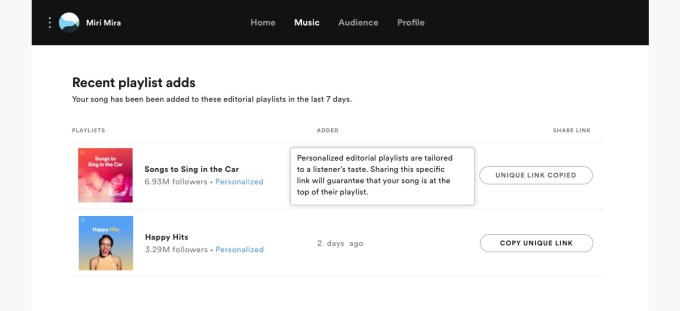Spotify this morning announced a major change to how its playlists will operate, with the news that some of its previously human-curated playlists will now be personalized based on listeners’ tastes. Before, Spotify offered personalized playlists like Discover Weekly, Release Radar, and Daily Mixes, among others, to offer users a way to enjoy the music they like and be introduced to new songs and artists that fit their interests. However, these were clearly separated from the curated playlists programmed by Spotify’s editorial team.
Now, Spotify says that will change.
“Some playlists will now be personalized for each listener based on their particular taste. This means that for those specific playlists, no two will be the same,” the company shared in a blog post.
Spotify says it decided to make this change after finding that users listened longer to the personalized playlists, during a trial of the new system. It also notes that the new system will increase the number of artists featured on playlists by 30 percent and the number of songs listened to by 35 percent – metrics that artists will surely like.
In addition, after a listener discovers a song on a personalized playlist, the number of those who then go seek out the track on their own for repeat listens was up by 80 percent, and the average number of time a listener saves a track was up by 66 percent, the company added.
Spotify was seen testing this change last year, where playlists like “Beast Mode,” “Chill Hits,” “Dance Party,” and “Metal Ballads” had become personalized among others focused on genre, decade, mood or activity – like “Happy Hits” or “Song to Sing in the Car,” for example. The company’s most popular playlists like “Today’s Top Hits” and “Rap Caviar” were not affected.
By adding personalization to playlists, Spotify is making a big bet on its algorithms doing a better job at programming. That’s not always the case.
While personalization technology can be great when it works, it can still be thrown off by sessions where you allow someone else to stream music with your account – like a child, your roommates, party attendees or others. (Technically, multiple users with regular access should be on a family plan with their own logins – but not everyone goes this route.) Personalization tech is also not always sophisticated enough to understand to understand the different levels of interest in, say, the music you use to fall asleep to, versus the songs you play because you actually like them.
In other words, if you had any issues with Spotify getting your musical taste wrong before, those will now expand to other areas of its service that were previously algorithm-free.
On the other hand, when the personalization succeeds, it could increase user engagement, loyalty and retention – areas that will help Spotify better compete with Apple Music, Pandora and others.

Because not all users will see the same playlists, Spotify is giving artists access to unique links to those playlists where their music is featured. This allows them to share a specific version of the playlist via Spotify for Artists and Spotify Analytics. Anyone who then clicks that link when posted on the web or social media will be taken to a version where the artist’s track is the first song.
Spotify says artists will be alerted about their additions to playlists through email notifications.
What the artist dashboards aren’t showing, though, are how many users are being presented with the customized version of the playlist with the artists’ music included.
Instead, the dashboard shows how many total followers the playlist has. That means these personalized playlists aren’t just about getting the right music in front of the right listeners – they’re also very much a marketing tool for the artists and their teams to leverage.
Spotify says these playlist changes are in effect as of now.